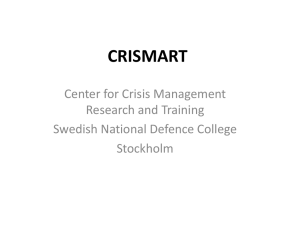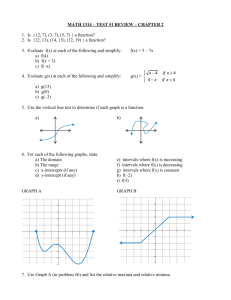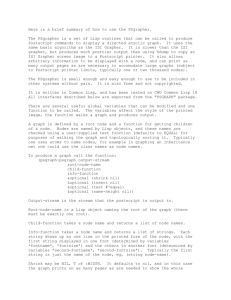1899 - In Praise of the Strenuous Life (Theodore Roosevelt)
advertisement
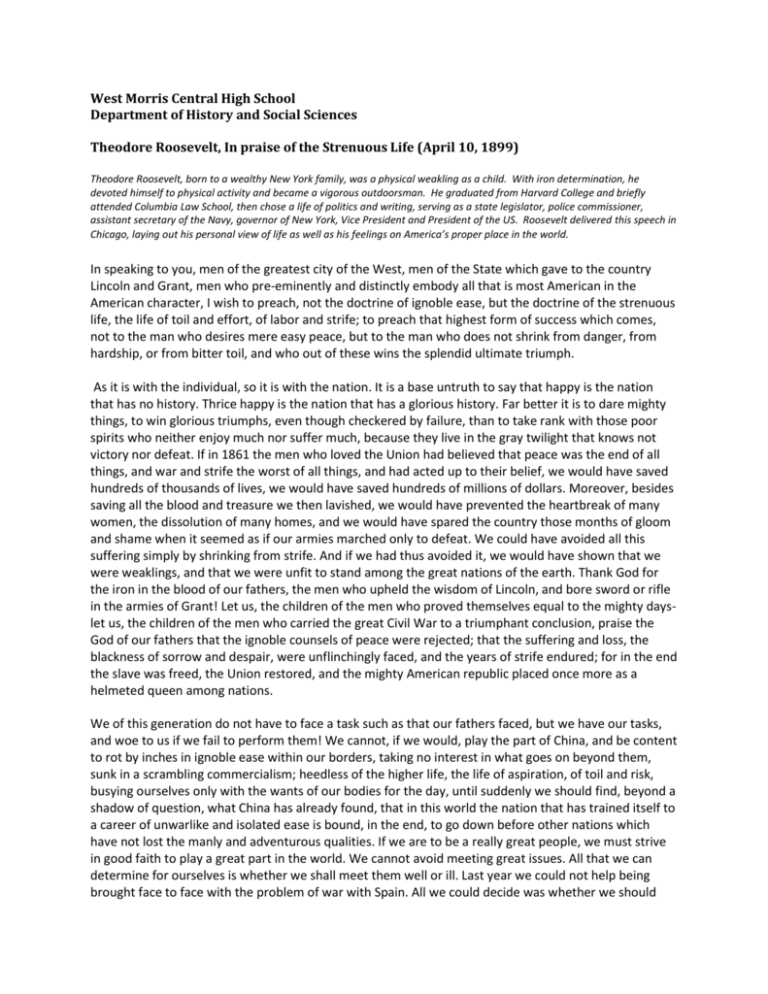
West Morris Central High School Department of History and Social Sciences Theodore Roosevelt, In praise of the Strenuous Life (April 10, 1899) Theodore Roosevelt, born to a wealthy New York family, was a physical weakling as a child. With iron determination, he devoted himself to physical activity and became a vigorous outdoorsman. He graduated from Harvard College and briefly attended Columbia Law School, then chose a life of politics and writing, serving as a state legislator, police commissioner, assistant secretary of the Navy, governor of New York, Vice President and President of the US. Roosevelt delivered this speech in Chicago, laying out his personal view of life as well as his feelings on America’s proper place in the world. In speaking to you, men of the greatest city of the West, men of the State which gave to the country Lincoln and Grant, men who pre-eminently and distinctly embody all that is most American in the American character, I wish to preach, not the doctrine of ignoble ease, but the doctrine of the strenuous life, the life of toil and effort, of labor and strife; to preach that highest form of success which comes, not to the man who desires mere easy peace, but to the man who does not shrink from danger, from hardship, or from bitter toil, and who out of these wins the splendid ultimate triumph. As it is with the individual, so it is with the nation. It is a base untruth to say that happy is the nation that has no history. Thrice happy is the nation that has a glorious history. Far better it is to dare mighty things, to win glorious triumphs, even though checkered by failure, than to take rank with those poor spirits who neither enjoy much nor suffer much, because they live in the gray twilight that knows not victory nor defeat. If in 1861 the men who loved the Union had believed that peace was the end of all things, and war and strife the worst of all things, and had acted up to their belief, we would have saved hundreds of thousands of lives, we would have saved hundreds of millions of dollars. Moreover, besides saving all the blood and treasure we then lavished, we would have prevented the heartbreak of many women, the dissolution of many homes, and we would have spared the country those months of gloom and shame when it seemed as if our armies marched only to defeat. We could have avoided all this suffering simply by shrinking from strife. And if we had thus avoided it, we would have shown that we were weaklings, and that we were unfit to stand among the great nations of the earth. Thank God for the iron in the blood of our fathers, the men who upheld the wisdom of Lincoln, and bore sword or rifle in the armies of Grant! Let us, the children of the men who proved themselves equal to the mighty dayslet us, the children of the men who carried the great Civil War to a triumphant conclusion, praise the God of our fathers that the ignoble counsels of peace were rejected; that the suffering and loss, the blackness of sorrow and despair, were unflinchingly faced, and the years of strife endured; for in the end the slave was freed, the Union restored, and the mighty American republic placed once more as a helmeted queen among nations. We of this generation do not have to face a task such as that our fathers faced, but we have our tasks, and woe to us if we fail to perform them! We cannot, if we would, play the part of China, and be content to rot by inches in ignoble ease within our borders, taking no interest in what goes on beyond them, sunk in a scrambling commercialism; heedless of the higher life, the life of aspiration, of toil and risk, busying ourselves only with the wants of our bodies for the day, until suddenly we should find, beyond a shadow of question, what China has already found, that in this world the nation that has trained itself to a career of unwarlike and isolated ease is bound, in the end, to go down before other nations which have not lost the manly and adventurous qualities. If we are to be a really great people, we must strive in good faith to play a great part in the world. We cannot avoid meeting great issues. All that we can determine for ourselves is whether we shall meet them well or ill. Last year we could not help being brought face to face with the problem of war with Spain. All we could decide was whether we should shrink like cowards from the contest, or enter into it as beseemed a brave and high-spirited people; and; once in, whether failure or success should crown our banners. So it is now. We cannot avoid the responsibilities that confront us in Hawaii, Cuba, Porto Rico, and the Philippines. All we can decide is whether we shall meet them in a way that will redound to the national credit, or whether we shall make of our dealings with these new problems a dark and shameful page in our history. To refuse to deal with them at all merely amounts to dealing with them badly. We have a given problem to solve. If we undertake the solution, there is, of course, always danger that we may not solve it aright; but to refuse to undertake the solution simply renders it certain that we cannot possibly solve it aright. The timid man, the lazy man, the man who distrusts his country, the over-civilized man, who has lost the great fighting, masterful virtues, the ignorant man, and the man of dull mind, whose soul is incapable of feeling the mighty lift that thrills “stern men with empires in their brains”-all these, of course, shrink from seeing the nation undertake its new duties; shrink from seeing us build a navy and an army adequate to our needs; shrink from seeing us do our share of the world’s work, by bringing order out of chaos in the great, fair tropic islands from which the valor of our soldiers and sailors has driven the Spanish flag. These are the men who fear the strenuous life, who fear the only national life which is really worth leading. .. …But because we set our own household in order we are not thereby excused from playing our part in the great affairs of the world. A man’s first duty is to his own home, but he is not thereby excused from doing his duty to the State; for if he fails in this second duty it is under the penalty of ceasing to be a free man. In the same way, while a nation’s first duty is within its own borders, it is not thereby absolved from facing its duties in the world as a whole; and if it refuses to do so, it merely forfeits its right to struggle for a place among the peoples that shape the destiny of mankind. In the West Indies and the Philippines alike we are confronted by most difficult problems. It is cowardly to shrink from solving them in the proper way; for solved they must be, if not by us, then by some stronger and more manful race. If we are too weak, too selfish, or too foolish to solve them, some bolder and abler people must undertake the solution. Personally, I am far too firm a believer in the greatness of my country and the power of my countrymen to admit for one moment that we shall ever be driven to the ignoble alternative. I preach to you, then, my countrymen, that our country calls not for the life of ease but for the life of strenuous endeavor. The twentieth century looms before us big with the fate of many nations. If we stand idly by, if we seek merely swollen, slothful ease and ignoble peace, if we shrink from the hard contests where men must win at hazard of their lives and at the risk of all they hold dear, then the bolder and stronger peoples will pass us by, and will win for themselves the domination of the world. Let us therefore boldly face the life of strife, resolute to do our duty well and manfully; resolute to uphold righteousness by deed and by word; resolute to be both honest and brave, to serve high ideals, yet to use practical methods. Above all, let us shrink from no strife, moral or physical, within or without the nation, provided we are certain that the strife is justified, for it is only through strife, through hard and dangerous endeavor, that we shall ultimately win the goal of true national greatness.
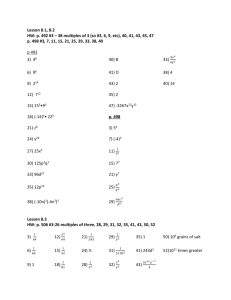
![4The Four Elements Seminar handout[1]](http://s3.studylib.net/store/data/007076123_1-8d6e6ebf76dd98c15879c508479187e4-300x300.png)

